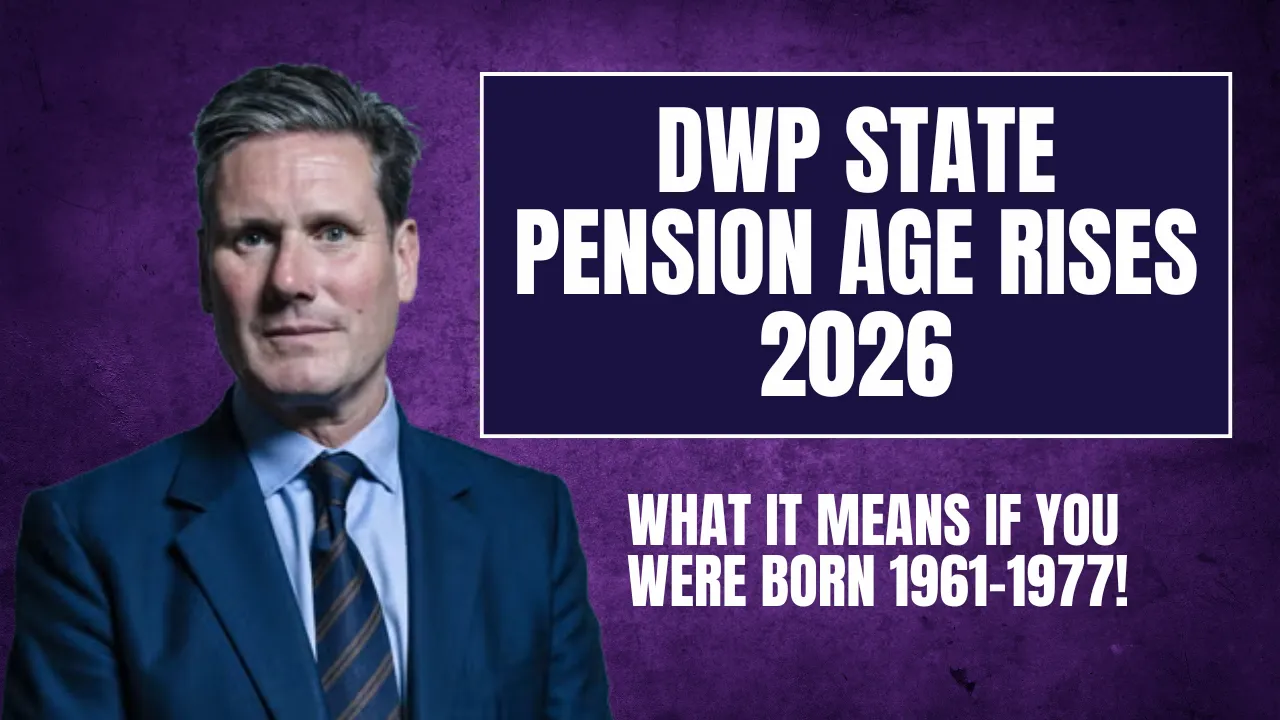Millions of UK residents face a major shift in retirement planning as the DWP State Pension Age Rises 2026. From April 2026, the eligibility age for the State Pension will move from 66 to 67, affecting those born between March 1961 and April 1977. This change reflects rising life expectancy, government efforts to sustain the pension system, and an evolving workforce. It’s vital for anyone approaching retirement to understand the implications, so they can adapt savings, continue National Insurance contributions, and consider alternatives like private pension schemes.
DWP State Pension Age Rises 2026
The DWP State Pension Age Rises 2026 means your pension eligibility date has changed if you were born between 6 March 1961 and 5 April 1977. Rather than accessing the pension at age 66, you’ll now wait until 67. This update is part of a wider pension age review, aiming to align the retirement system with modern demographics. Keep reading to see how this affects your finances, and how you can adjust your retirement planning to build a secure future.
Overview Table
| Heading | Summary |
| Current pension age | 66 years |
| New pension age | 67 (phased April 2026–March 2028) |
| Affected birth dates | Born 6 March 1961–5 April 1977 |
| Reason for change | Longer life expectancy, cost of pensions, demographic shift |
| Next planned rise | To 68 between 2044–2046; further review expected |
| April 2025 increase | Triple Lock rise of 4.1%, up to ~£231/week |
| Support steps | Check National Insurance record, consider private pension |
What’s Changing and When?
Currently, both men and women qualify for the State Pension at 66. However, beginning April 2026, this threshold will start to shift upward. Over a two-year period, those born between March 1961 and April 1977 will no longer be able to claim at 66; instead, their retirement planning must accommodate a new eligibility age of 67. By March 2028, everyone in that group will fall under the new rule. This gradual rollout is meant to give people time to adjust their saving strategies.
Who’s Affected?
- Born before 6 March 1961: retirement age remains at 66.
- Born between 6 March 1961 and 5 April 1977: pension eligibility now set at age 67.
- Born after 5 April 1977: expect future increases, potentially up to 68, following upcoming pension age reviews.
If your birthday is in that middle range, you’ll need to update your plans, budget longer working years, and possibly boost your private pension contributions.
Why the Change?
- Rising life expectancy: Since the 1940s, people are living more than a decade longer on average. More retirees for longer means greater pressure on the pension system and public finances.
- Increasing pension costs: Annual payouts exceed £100 billion. Delaying pension eligibility by just a year reduces government borrowing and eases long-term fiscal strain.
- Labour participation: Extending working age aligns with modern workplaces and encourages older employees to remain active in the job market.
This shift forms part of ongoing policy adjustments to align the system with demographic trends, ensuring the pension remains sustainable.
Future Increases on the Horizon
The journey doesn’t end in 2028. A move to age 68 is already planned between 2044 and 2046, based on current projections. The government will conduct pension age reviews every five years. As life expectancy and financial pressures evolve, the timeline could accelerate, with age 68 or even 69 becoming a reality sooner. Staying updated is key to long-term financial stability, especially for those in the younger end of the affected group.
State Pension Increase in April 2025
Thanks to the Triple Lock guarantee, the State Pension rose by 4.1% in April 2025, the highest of CPI inflation, average earnings growth, or a 2.5% minimum. This resulted in a weekly payout of around £231, up from about £222. This annual uplift helps retirees manage rising living costs, though planning must still consider the higher retirement age.
New State Pension Amount (April 2025):
| Pension Type | Annual Amount | Weekly Equivalent |
| New State Pension 2025 | £12,016.75 | ≈ £231/week |
This boost adds roughly £475 per year compared to the previous year, offering valuable breathing space for pensioners. It’s important to note that the Triple Lock may or may not continue under future government policies.
Planning for Retirement: What You Can Do Now
- Check your pension age: Use the official GOV.UK State Pension age calculator to find your exact eligibility date.
- Review your National Insurance record: Verify that you have the required 35 qualifying years for the full State Pension.
- Boost private pension savings: Top up pensions through personal or workplace schemes to compensate for the one-year delay.
- Adjust financial timelines: Update budgets, mortgage plans, and lifestyle goals based on the new pension age.
- Monitor government reviews: Keep an eye on upcoming pension age reviews, as the next one is expected soon.
- Consider working longer: The extra year in employment could increase pension contributions and reduce years reliant on savings.
- Seek expert advice: Financial advisors can help tailor retirement plans based on your unique situation.
FAQs
1. When does the State Pension age increase to 67?
The pension eligibility age rises gradually between April 2026 and March 2028, affecting those born between March 1961 and April 1977.
2. Who must wait until 67 to claim the pension?
People born from 6 March 1961 to 5 April 1977 are now eligible to receive the State Pension at age 67 instead of 66.
3. Will the pension age rise again after 67?
Yes. Age 68 is scheduled between 2044 and 2046, and future pension age reviews could bring changes earlier, influenced by life expectancy trends.
4. How much did the State Pension increase in April 2025?
It increased by 4.1%, raising the annual amount to £12,016.75—roughly £231 per week—under the Triple Lock rules.
5. Can I invest in a private pension to prepare?
Absolutely. Bolstering a private pension or workplace pension can help fill the gap caused by waiting an extra year for State Pension.
Final Thought
The DWP State Pension Age Rises 2026 initiative marks a pivotal moment for anyone nearing retirement. It’s more than just a date change – it demands timely adjustments in retirement planning, pension contributions, and financial expectations. By reviewing your National Insurance record, exploring private pension options, and staying aware of future pension age review decisions, you can stay prepared and confident in securing a stable retirement income.

















